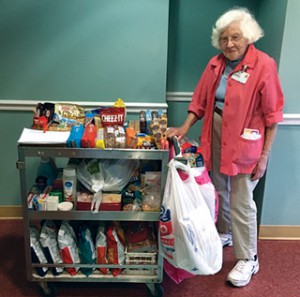
Many senior citizens living in assisted care facilities depend upon family,  friends and staff to meet their needs. Due to issues with mobility and limited transportation options, seniors often find themselves unable to purchase the personal products they crave, from face cream to potato chips. For many older adults, this loss of independence and control can be frustrating and dispiriting.
friends and staff to meet their needs. Due to issues with mobility and limited transportation options, seniors often find themselves unable to purchase the personal products they crave, from face cream to potato chips. For many older adults, this loss of independence and control can be frustrating and dispiriting.
Dr. Eleanor Feldman Barbera came up with a simple solution – the Independence Cart. A “store on wheels,” the Independence Cart includes basic supplies – from stationary to snacks – available for purchase. The cart not only provides residents with a chance to make simple purchases, it frees up time for staff and family members often burdened with fulfilling these requests. Though some facilities have experimented with candy carts in the past – often to disastrous dietary results – Dr. Barbera champions the idea.
“I believe this concept, taken in the right direction, could be successful in every way.”
At one senior living property located in the middle-class borough of Queens, the Independence Cart delivers more than greeting cards and candy bars; it provides the chance to exert some self-sufficiency. At the helm of this mobile shopping mall is 96-year-old Trudy Schwartz (pictured). Though small in stature, and older than some of her customers, Trudy feels energized by the hours she spends volunteering at the center.
“I’ve been so fortunate all my life that I really feel I have to do something to give back,” Trudy admits in an interview with Dr. Barbera about the cart.
“I have lovely children and grandchildren and good health. Sure, I’ve had troubles, but for the most part, I’ve been very fortunate.”
Trudy took over the cart from another volunteer after spending time at the center visiting her mother, who was a resident for five years. Initially, the cart contained mostly junk food, but since then the inventory has evolved to include toiletries, sweets, and even special requests. Trudy buys provisions based on requests and popularity.
“I spend several days shopping because I try to get things on sale,” she explains. “I have a special form so that I don’t have to pay tax. That way I can give people the best rate. I don’t make money from this as a volunteer.”
The ability to purchase items on their own can help relieve some of the emotional toll seniors experience once they are no longer conduct their daily lives without assistance. It can be humiliating to ask for support, and some may even feel they’re begging for help.
As Dr. Barbera explains, “Not being able to obtain an item that’s been a favorite for 60 years can lead to frustration and an added sense of loss.”
“This situation unnecessarily adds to the residents’ sense of helplessness and dependence,” she adds before concluding, “A mobile store removes these obstacles, gives residence some independence and can allow them to retain cherished roles in life, such as through purchase of stationary and stamps for correspondence or a gift for a family member.”
Though she plans to retire in May of this year, Trudy hopes the cart will continue.
“The main purpose is to give them some autonomy,” she says. “I think it’s a great thing to do for residents.”


